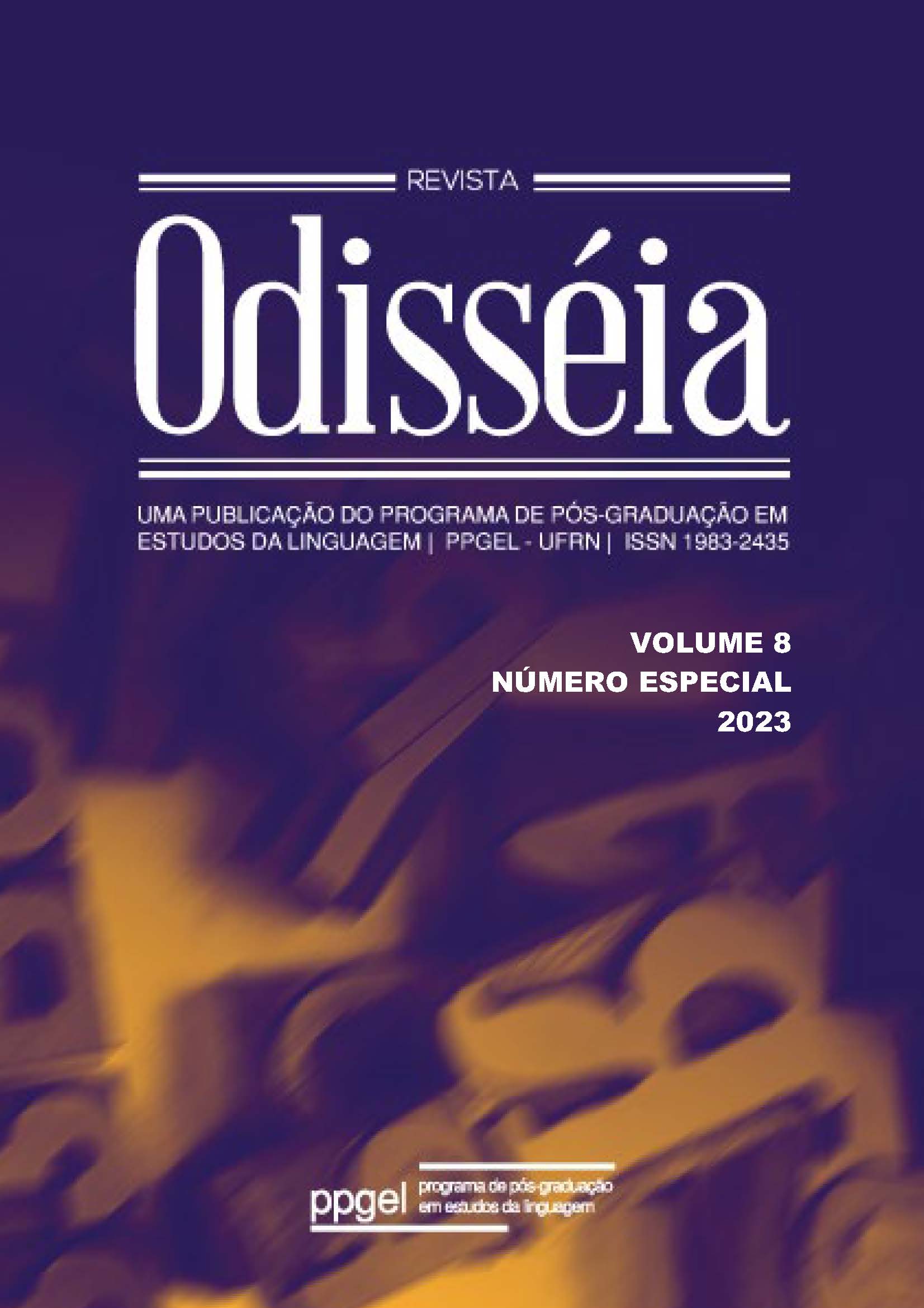Valle lacrimarum
violence and patriarchy in Marido, by Lídia Jorge
DOI:
https://doi.org/10.21680/1983-2435.2023v8nEspecialID31619Keywords:
Lídia Jorge. Literature. Violence. Patriarchy.Abstract
“Marido”, short story by Portuguese writer Lídia Jorge, portraits a common situation of violence associated to the marriage of protagonist Lúcia. In this paper, we analyze the representation of the patriarchal violence, in articulation with formal aspects of the story. For this approach, we used the authors Heleith Saffioti, Gerda Lerner, Michelle Perrot, Bryan Turner, among others. From reading the short story, we observe that the christian religious discourse evokes the idea of marriage as something unbreakable and sacred. The need of protection by Lúcia, immerse in a confined space with recurrent violence, is reinforced by the lexical reiteration. The word choice enlightens the situation of silence. The husband is constructed as the figure of patriarchy, omnipresent since the title of the short story. Our reading of “Marido” makes it possible to see some patriarchal operators of women’s silence and submission.
Downloads
References
BRIDI, Marlise Vaz. Lídia Jorge contista: a face menos visível de uma escritora maior. In: JORGE, Lídia. Antologia de contos. São Paulo: LeYa, 2014. p. 7-15.
CORTÁZAR, Julio. Alguns aspectos do conto. In: CORTÁZAR, Julio. Valise de cronópio. Tradução Davi Arrigucci Jr., João Alexandre Barbosa. São Paulo: Perspectiva, 2006. p. 147-163.
GINZBURG, Jaime. Literatura, violência e melancolia. Campinas: Autores Associados, 2012.
HOBSBAWN, Eric. A era dos extremos: o breve século XX (1914-1991). Tradução Marcos Santarrita. 2. ed. São Paulo: Companhia das Letras, 1995.
JORGE, Lídia. Marido. In: JORGE, Lídia. Antologia de contos. São Paulo: LeYa, 2014. p. 17-26.
JOUVE, Vincent. Por que estudar literatura?. Tradução Marcos Bagno, Marcos Marcionilo. 1. ed. São Paulo: Parábola, 2012.
LE GOFF, Jacques; TRUONG, Nicolas. Uma história do corpo na Idade Média. Tradução Marcos Flamínio Peres. 7. ed. Rio de Janeiro: Civilização Brasileira, 2018.
LERNER, Gerda. A criação do patriarcado: história da opressão das mulheres pelos homens. Tradução Luiza Sellera. 1. ed. São Paulo: Cultrix, 2019.
MENEGHEL, Stela Nazareth; PORTELLA, Ana Paula. Feminicídios: conceitos, tipos e cenários. Ciência e Saúde Coletiva, Rio de Janeiro, v. 22, n. 9, p. 3077-3086, 2017. Disponível em: https://doi.org/10.1590/1413-81232017229.11412017. Acesso em: 13 jul. 2023.
ORLANDI, Eni Puccinelli. As formas do silêncio: no movimento dos sentidos. 6. ed. Campinas: Editora da Unicamp, 2007.
PERROT, Michelle. Corpos subjugados. In: PERROT, Michelle. As mulheres ou os silêncios da história. Tradução Viviane Ribeiro. São Paulo: EDUSC, 2005. p. 447-454.
PERROT, Michelle. Público, privado e relações entre os sexos. In: PERROT, Michelle. As mulheres ou os silêncios da história. Tradução Viviane Ribeiro. São Paulo: EDUSC, 2005. p. 455-465.
REZOLA, Maria Inácia. A Igreja Católica nas origens do salazarismo. Locus: Revista de História, Juiz de Fora, v. 18, n. 1, p. 69-88, 2012. Disponível em: https://periodicos.ufjf.br/index.php/locus/article/view/20363/22371. Acesso em: 19 ago. 2022.
SAFFIOTI, Heleieth. Gênero patriarcado violência. 2. ed. São Paulo: Expressão Popular, 2015.
TURNER, Bryan S. Patriarcado: el cuerpo de Eva. In: TURNER, Bryan S. El cuerpo y la sociedad: exploraciones en teoría social. Tradução Eric Herrán Salvatti. México: Fondo de Cultura Económica, 1989. p. 150-173.
Downloads
Published
How to Cite
Issue
Section
License
Copyright (c) 2023 Odisseia

This work is licensed under a Creative Commons Attribution-NonCommercial-ShareAlike 4.0 International License.
Thisa work has been licensed under Creative Commons - Atribuição - NãoComercial - CompartilhaIgual 3.0 Não Adaptada.


















